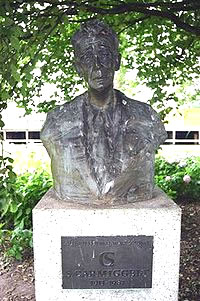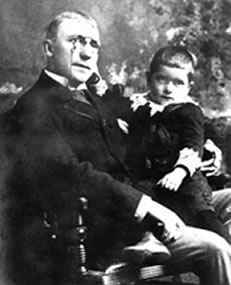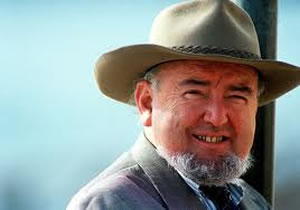|
De Nederlandse schrijver en dichter Simon Carmiggelt werd geboren op 7 oktober 1913 in Den Haag. Zie ook mijn blog van 7 oktober 2010 en eveneens alle tags voor Simon Carmiggelt op dit blog.xml:namespace prefix = o ns = "urn:schemas-microsoft-com:office:office" />
Uit: Vroeger kon je lachen - De drank
In het Vondelpark kwam een man naast me zitten op het bankje en zei: Negenenvijftig ben ik. En weet je hoe lang ik al droog sta?
Hij zag er fris uit, dus het zou best eens lang kunnen zijn.
Vijf jaar, riep hij, dat is een hele tijd. Maar 't was ook wel hard nodig. Ik zat er lelijk aan - aan het huppelwater. Als je alles wat ik gezopen heb uitstortte bij de afsluitdijk, had je een nieuwe Zuiderzee. 's Ochtends om halfnegen nam ik er al een. 'n Eye-opener, noemen de Yanks dat. Gelukkig ben ik nooit aan vrouw en kinderen begonnen, dus andere levens heb ik niet verwoest. Ik was alleen mezelf aan 't slopen, met regeringssubsidie, Ziektewet, weet je. Maar de aa heeft me van de drank afgeholpen. Dat moet ik ze nageven. Geen drup meer, vijf jaar. Weet je wat ik gedaan heb vrijdagavond? Ik ben eens flink doorgezakt, in een café. Tegen sluitingstijd zat ik weer net zo slap te ouwehoeren als vroeger. Ik hóórde 't mezelf doen, of ik een grammofoonplaat afdraaide. Dat was goed. Dat had ik verworven in die vijf jaar. Zal ik jou eens vertellen wat 't is, met die aa?
Doe 't, zei ik. Want al mijn kennis van de Anonieme Alcoholisten stamt uit de boekjes.
Ze helpen je er vanaf, zei hij, dat is mooi. Maar zodra je droog staat, ga je op die vergaderingen komen. Daar vertelt iedereen op z'n beurt hoe diep hij gezonken was voor hij de neut liet staan. Net oude temeies, die geen klanten meer hebben, maar er zo graag nog eens over praten. Ik ook hoor. Ik ging er helemaal in op. Als een ander aan 't getuigen was dacht ik: Ik wou dat-ie klaar was, dan kan ik weer. En tegen natte drinkers gedroeg ik me net als een dominee, die bereid is een ander z'n strot af te snijden voor z'n geloof. Jij moet dit en jij moet dat. Maar omdat m'n geest steeds helderder ging werken begon ik langzaam iets in te zien. Ik dacht - waar ze hier mee bezig zijn, is je bang maken voor de drank. En dat is niet goed. Je moet jezelf leren kennen. Want wat weet je van jezelf?
Hij keek me aan met een heldere, doordringende blik waarin een lichte spot twinkelde. Een oorspronkelijke denker. Je kon hem geen enkele uitgestoomde waarde verkopen.
Weet je wat de doorslag gaf? zei hij. De verjaardag van me zuster. Die woont in Diemen. Ze zaten daar natuurlijk allemaal te peren, al bleef het amateurwerk. En ik hield het op colaatje-colaatje-colaatje. Je krijgt er wel het lendewater van, maar je blijft bij de tijd. Ik ging terug met de nachtbus. Kijk, een natte zuiper, die mist de nachtbus, maar een droge zuiper haalt 'm. Nou zat er, voor we uit Diemen vertrokken, al een vent in die bus die naar een bruiloft of zo iets was geweest, want hij had 'n mombakkes voor. Zo'n plastic kop van een ouwe vrek met hangwangen. En zwaar ingenomen had-ie óók. Dat hoorde ik meteen aan z'n gezwets. Maar hij liet het niet bij zwetsen. D'r zat een jonge vrouw en die begon hij lastig te vallen. Eerst met woorden en toen met z'n handen. Die vrouw probeerde hem af te weren, maar ze kon 'm niet baas.
Hij glimlachte een beetje bitter."

Simon Carmiggelt (7 oktober 1913 30 november 1987)
Borstbeeld bij de Weteringschans, Amsterdam.
De Amerikaanse dichter en schrijver James Whitcomb Riley werd geboren op 7 oktober 1849 in Greenfield, Indiana. Zie ook mijn blog van 7 oktober 2010 en eveneens alle tags voor James Whitcomb Riley op dit blog.
A Dream Of Autumn
Mellow hazes, lowly trailing
Over wood and meadow, veiling
Somber skies, with wildfowl sailing
Sailor-like to foreign lands;
And the north-wind overleaping
Summer's brink, and floodlike sweeping
Wrecks of roses where the weeping
Willows wring their helpless hands.
Flared, like Titan torches flinging
Flakes of flame and embers, springing
From the vale the trees stand swinging
In the moaning atmosphere;
While in dead'ning-lands the lowing
Of the cattle, sadder growing,
Fills the sense to overflowing
With the sorrow of the year.
Sorrowfully, yet the sweeter
Sings the brook in rippled meter
Under boughs that lithely teeter
Lorn birds, answering from the shores
Through the viny, shady-shiny
Interspaces, shot with tiny
Flying motes that fleck the winy
Wave-engraven sycamores.
Fields of ragged stubble, wrangled
With rank weeds, and shocks of tangled
Corn, with crests like rent plumes dangled
Over Harvest's battle-piain;
And the sudden whir and whistle
Of the quail that, like a missile,
Whizzes over thorn and thistle,
And, a missile, drops again.
Muffled voices, hid in thickets
Where the redbird stops to stick its
Ruddy beak betwixt the pickets
Of the truant's rustic trap;
And the sound of laughter ringing
Where, within the wild-vine swinging,
Climb Bacchante's schoolmates, flinging
Purple clusters in her lap.
Rich as wine, the sunset flashes
Round the tilted world, and dashes
Up the sloping west and splashes
Red foam over sky and sea--
Till my dream of Autumn, paling
In the splendor all-prevailing,
Like a sallow leaf goes sailing
Down the silence solemnly.

James Whitcomb Riley (7 oktober 1849 22 juli 1916)
Hier met een neefje
De Australische schrijver Thomas Keneally werd geboren op 7 oktober 1935 in Sydney. Zie ook mijn blog van 7 maart 2008 en ook mijn blog van 7 oktober 2009 en ook mijn blog van 7 oktober 2010
Uit: Schindler's List
Trying still to find, in the shadow of Himmler, some hint of Oskar's later enthusiasms, we encounter the Schindlers' next-door neighbor, a liberal rabbi named Dr. Felix Kantor. Rabbi Kantor was a disciple of Abraham Geiger, the German liberalizer of Judaism who claimed that it was no crime, in fact was praiseworthy, to be a German as well as a Jew. Rabbi Kantor was no rigid village scholar. He dressed in the modern mode and spoke German in the house. He called his place of worship a "temple" and not by that older name, "synagogue." His temple was attended by Jewish doctors, engineers, and proprietors of textile mills in Zwittau. When they traveled, they told other businessmen, "Our rabbi is Dr. Kantorhe writes articles not only for the Jewish journals in Prague and Brno, but for the dailies as well."
Rabbi Kantor's two sons went to the same school as the son of his German neighbor Schindler. Both boys were bright enough eventually, perhaps, to become two of the rare Jewish professors at the German University of Prague. These crew-cut German speaking prodigies raced in knee pants around the summer gardens. Chasing the Schindler children and being chased. And Kantor, watching them flash in and out among the yew hedges, might have thought it was all working as Geiger and Graetz and Lazarus and all those other nineteenth-century German-Jewish liberals had predicted. We lead enlightened lives, we are greeted by German neighborsMr. Schindler will even make snide remarks about Czech statesmen in our hearing. We are secular scholars as well as sensible interpreters of the Talmud. We belong both to the twentieth century and to an ancient tribal race. We are neither offensive nor offended against. Later, in the mid-1930s, the rabbi would revise this happy estimation and make up his mind in the end that his sons could never buy off the National Socialists with a German-language Ph.D.that there was no outcrop of twentieth-century technology or secular scholarship behind which a Jew could find sanctuary, any more than there could ever be a species of rabbi acceptable to the new German legislators. In 1936 all the Kantors moved to Belgium. The Schindlers never heard of them again.

Thomas Keneally (Sydney, 7 oktober 1935)
Zie voor nog meer schrijvers van de 7e oktober ook mijn vorige blog van vandaag.
|



